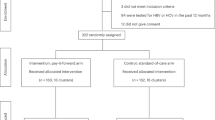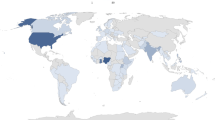Abstract
HIV stigma is a barrier to achieving the goals of the US Ending the HIV Epidemic initiative. We analyzed data from the Medical Monitoring Project (MMP) collected during 6/2018–5/2019 from 4050 US adults with diagnosed HIV. We reported national estimates of HIV stigma and assessed their associations with sociodemographic and clinical characteristics. Disclosure concerns and stigma related to negative public attitudes were common. Stigma was higher among younger age groups, women and transgender people, Black and Hispanic/Latino men and women, and Black and Hispanic/Latino men who have sex with men. Stigma was associated with lower antiretroviral therapy use and adherence, missed HIV care visits, and symptoms of depression or anxiety. The estimates presented provide a benchmark from which the nation can monitor its progress. The findings suggest the need for enhanced stigma-reduction efforts among specific groups and the importance of addressing stigma around disclosure and community attitudes.

Similar content being viewed by others
References
Fauci AS, Redfield RR, Sigounas G, Weahkee MD, Giroir BP. Ending the HIV epidemic: a plan for the United States. JAMA. 2019. https://doi.org/10.1001/jama.2019.1343.
Link BG, Phelan JC. Stigma and its public health implications. Lancet (London, England). 2006;367(9509):528–9.
Boehme AK, Moneyham L, McLeod J, Walcott MW, Wright L, Seal P, et al. HIV-infected women’s relationships with their health care providers in the rural deep south: an exploratory study. Health Care Women Int. 2012;33(4):403–19.
Chambers LA, Rueda S, Baker DN, Wilson MG, Deutsch R, Raeifar E, et al. Stigma, HIV and health: a qualitative synthesis. BMC Public Health. 2015;15:848.
Sweeney SM, Vanable PA. The association of HIV-related stigma to HIV medication adherence: a systematic review and synthesis of the literature. AIDS Behav. 2016;20(1):29–50.
U.S. Department of Health and Human Services. HIV national strategic plan for the United States: a roadmap to end the epidemic 2021–2025 Washington, DC. 2021 https://files.hiv.gov/s3fs-public/HIV-National-Strategic-Plan-2021-2025.pdf. Accessed 9 Aug 2021.
Wright K, Naar-King S, Lam P, Templin T, Frey M. Stigma scale revised: reliability and validity of a brief measure of stigma for HIV+ youth. J Adolesc Health: Off Publ Soc Adolesc Med. 2007;40(1):96–8.
Baugher AR, Beer L, Fagan JL, Mattson CL, Freedman M, Skarbinski J, et al. Prevalence of internalized HIV-related stigma among HIV-infected adults in care, United States, 2011–2013. AIDS Behav. 2017;21(9):2600–8.
Baunach DM, Burgess EO. HIV/AIDS prejudice in the American deep south. Sociol Spectr. 2013;33(2):175–95.
Colbert AM, Kim KH, Sereika SM, Erlen JA. An examination of the relationships among gender, health status, social support, and HIV-related stigma. J Assoc Nurses AIDS Care. 2010;21(4):302–13.
Beer L, Johnson CH, Fagan JL, Frazier EL, Nyaku M, Craw JA, et al. A National behavioral and clinical surveillance system of adults with diagnosed HIV (The Medical Monitoring Project): protocol for an annual cross-sectional interview and medical record abstraction survey. JMIR Res Protoc. 2019;8(11):15453.
Centers for Disease Control and Prevention. Behavioral and clinical characteristics of persons with diagnosed HIV infection—Medical Monitoring Project, United States, 2018 Cycle (June 2018–May 2019). 2020 https://www.cdc.gov/hiv/library/reports/hiv-surveillance.html. Accessed 9 Aug 2021.
Heeringa S, West BT, Berglund PA. Applied survey data analysis. Boca Raton: Taylor & Francis; 2010.
Wilson IB, Lee Y, Michaud J, Fowler FJ Jr, Rogers WH. Validation of a new three-item self-report measure for medication adherence. AIDS Behav. 2016;20(11):2700–8.
Kroenke K, Strine TW, Spitzer RL, Williams JB, Berry JT, Mokdad AH. The Phq-8 as a measure of current depression in the general population. J Affect Disord. 2009;114(1–3):163–73.
Spitzer RL, Kroenke K, Williams JB, Lowe B. A brief measure for assessing generalized anxiety disorder: the Gad-7. Arch Intern Med. 2006;166(10):1092–7.
Quinn K, Voisin DR, Bouris A, Jaffe K, Kuhns L, Eavou R, et al. Multiple dimensions of stigma and health related factors among young black men who have sex with men. AIDS Behav. 2017;21(1):207–16.
Tanney MR, Naar-King S, MacDonnel K. Depression and stigma in high-risk youth living with HIV: a multi-site study. J Pediatric Health Care: Off Publ Natl Assoc Pediatr Nurse Assoc & Pract. 2012;26(4):300–5.
Tzemis D, Forrest JI, Puskas CM, Zhang W, Orchard TR, Palmer AK, et al. Identifying self-perceived HIV-related stigma in a population accessing antiretroviral therapy. AIDS Care. 2013;25(1):95–102.
Brewer R, Hood KB, Moore M, Spieldenner A, Daunis C, Mukherjee S, et al. An exploratory study of resilience, HIV-related stigma, and hiv care outcomes among men who have sex with men (MSM) living with HIV in Louisiana. AIDS Behav. 2020. https://doi.org/10.1007/s10461-020-02778-5.
Eaton LA, Driffin DD, Kegler C, Smith H, Conway-Washington C, White D, et al. The role of stigma and medical mistrust in the routine health care engagement of black men who have sex with men. Am J Public Health. 2015;105(2):e75-82.
Green HD, Weeks MR, Berman M, Salvi A, Gonzalez R, Rohena L, et al. The impact of perceptions of community stigma on utilization of HIV care services. J Racial Ethn Health Disparities. 2019. https://doi.org/10.1007/s40615-019-00667-9.
Katz IT, Ryu AE, Onuegbu AG, Psaros C, Weiser SD, Bangsberg DR, et al. Impact of HIV-related stigma on treatment adherence: systematic review and meta-synthesis. J Int AIDS Soc. 2013;16(3 Suppl 2):18640.
Reif S, Wilson E, McAllaster C, Pence B. The relationship of HIV-related stigma and health care outcomes in the US deep south. AIDS Behav. 2019;23(Suppl 3):242–50.
Rueda S, Mitra S, Chen S, Gogolishvili D, Globerman J, Chambers L, et al. Examining the associations between HIV-related stigma and health outcomes in people living with HIV/AIDS: a series of meta-analyses. BMJ open. 2016;6(7):e011453.
Ma PHX, Chan ZCY, Loke AY. Self-stigma reduction interventions for people living with HIV/AIDS and their families: a systematic review. AIDS Behav. 2019;23(3):707–41.
Mak WWS, Mo PKH, Ma GYK, Lam MYY. Meta-analysis and systematic review of studies on the effectiveness of HIV stigma reduction programs. Soc Sci Med. 1982;2017(188):30–40.
Centers for Disease Control and Prevention. Compendium of evidence-based interventions and best practices for HIV prevention. https://www.cdc.gov/hiv/research/interventionresearch/compendium/index.html. Accessed 9 Aug 2021.
Denison JA, Burke VM, Miti S, Nonyane BAS, Frimpong C, Merrill KG, et al. Project YES! youth engaging for success: a randomized controlled trial assessing the impact of a clinic-based peer mentoring program on viral suppression, adherence and internalized stigma among HIV-positive youth (15–24 years) in Ndola, Zambia. PLoS One. 2020;15(4):e0230703.
Beer L, McCree DH, Jeffries WLt, Lemons A, Sionean C. Recent US centers for disease control and prevention activities to reduce HIV stigma. J Int Assoc Provid AIDS Care. 2019;18:23259582188541.
Hull SJ, Davis CR, Hollander G, Gasiorowicz M, Jeffries WLt, Gray S, et al. Evaluation of the acceptance journeys social marketing campaign to reduce homophobia. Am J Public Health. 2017;107(1):173–9.
Relf MV, Holzemer WL, Holt L, Nyblade L, Ellis Caiola C. A review of the state of the science of HIV and stigma: context, conceptualization, measurement, interventions, gaps, and future priorities. J Assoc Nurses AIDS Care. 2021. https://doi.org/10.1097/JNC.0000000000000237.
Mugavero MJ, Westfall AO, Cole SR, Geng EH, Crane HM, Kitahata MM, et al. Beyond core indicators of retention in HIV care: missed clinic visits are independently associated with all-cause mortality. Clin Infect Dis: Off Publ Infect Dis Soc Am. 2014;59(10):1471–9.
Christopoulos KA, Neilands TB, Hartogensis W, Geng EH, Sauceda J, Mugavero MJ, et al. Internalized HIV stigma is associated with concurrent viremia and poor retention in a cohort of US patients in HIV care. J Acquir Immune Defic Syndr. 2019;82(2):116–23.
Kemp CG, Lipira L, Huh D, Nevin PE, Turan JM, Simoni JM, et al. HIV stigma and viral load among African-American women receiving treatment for HIV. AIDS (London, England). 2019;33(9):1511–9.
Lipira L, Williams EC, Huh D, Kemp CG, Nevin PE, Greene P, et al. HIV-related stigma and viral suppression among African-American women: exploring the mediating roles of depression and ART nonadherence. AIDS Behav. 2019;23(8):2025–36.
Radcliffe J, Doty N, Hawkins LA, Gaskins CS, Beidas R, Rudy BJ. Stigma and sexual health risk in HIV-positive African American young men who have sex with men. AIDS Patient Care STDS. 2010;24(8):493–9.
Vanable PA, Carey MP, Blair DC, Littlewood RA. Impact of HIV-related stigma on health behaviors and psychological adjustment among HIV-positive men and women. AIDS Behav. 2006;10(5):473–82.
Algarin AB, Sheehan DM, Varas-Diaz N, Fennie K, Zhou Z, Spencer EC, et al. Enacted HIV-related stigma’s association with anxiety & depression among people living with HIV (PLWH) in Florida. AIDS Behav. 2020. https://doi.org/10.1007/s10461-020-02948-5.
Beer L, Tie Y, Padilla M, Shouse RL. Generalized anxiety disorder symptoms among persons with diagnosed HIV in the United States. AIDS (London, England). 2019;33(11):1781–7.
Hosek SG, Lemos D, Harper GW, Telander K. Evaluating the acceptability and feasibility of project ACCEPT: an intervention for youth newly diagnosed with HIV. AIDS Educ Prev: Off Publ Int Soc AIDS Educ. 2011;23(2):128–44.
Pomeroy EC, Rubin A, Walker RJ. Effectiveness of a psychoeducational and task-centered group intervention for family members of people with AIDS. Soc Work Res. 1995;19(3):142–52.
Dowshen N, Binns HJ, Garofalo R. Experiences of HIV-related stigma among young men who have sex with men. AIDS Patient Care STDS. 2009;23(5):371–6.
Wiklander M, Rydström LL, Ygge BM, Navér L, Wettergren L, Eriksson LE. Psychometric properties of a short version of the HIV stigma scale, adapted for children with HIV infection. Health Qual Life Outcomes. 2013;11:195.
Turan JM, Elafros MA, Logie CH, Banik S, Turan B, Crockett KB, et al. Challenges and opportunities in examining and addressing intersectional stigma and health. BMC Med. 2019;17(1):7.
Acknowledgements
We thank MMP participants, project area staff, and Provider and Community Advisory Board members. We also acknowledge the contributions of the Clinical Outcomes Team and Behavioral and Clinical Surveillance Branch at CDC. The authors declare no conflicts of interest. Funding for the Medical Monitoring Project is provided by the Centers for Disease Control and Prevention. The findings and conclusions in this report are those of the authors and do not necessarily represent the views of the Centers for Disease Control and Prevention.
Author information
Authors and Affiliations
Consortia
Corresponding author
Ethics declarations
Ethical Approval
MMP data collection is part of routine public health surveillance and was determined to be non-research.
Consent to Participate
Informed consent was obtained from all interviewed participants.
Additional information
Publisher's Note
Springer Nature remains neutral with regard to jurisdictional claims in published maps and institutional affiliations.
Rights and permissions
About this article
Cite this article
Beer, L., Tie, Y., McCree, D.H. et al. HIV Stigma Among a National Probability Sample of Adults with Diagnosed HIV—United States, 2018–2019. AIDS Behav 26 (Suppl 1), 39–50 (2022). https://doi.org/10.1007/s10461-021-03414-6
Accepted:
Published:
Issue Date:
DOI: https://doi.org/10.1007/s10461-021-03414-6




